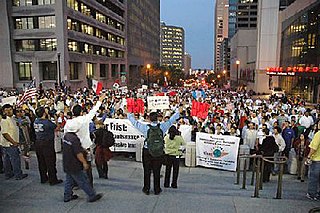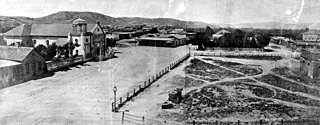Related Research Articles

Mexican Americans are Americans of full or partial Mexican heritage. In 2019,Mexican Americans comprised 11.3% of the US population and 61.5% of all Hispanic and Latino Americans. In 2019,71% of Mexican Americans were born in the United States,though they make up 53% of the total population of foreign-born Hispanic Americans and 25% of the total foreign-born population. The United States is home to the second-largest Mexican community in the world,behind only Mexico. Most Mexican Americans reside in the Southwest,with over 60% of Mexican Americans living in the states of California and Texas.

The United Farm Workers of America,or more commonly just United Farm Workers (UFW),is a labor union for farmworkers in the United States. It originated from the merger of two workers' rights organizations,the Agricultural Workers Organizing Committee (AWOC) led by organizer Larry Itliong,and the National Farm Workers Association (NFWA) led by César Chávez and Dolores Huerta. They became allied and transformed from workers' rights organizations into a union as a result of a series of strikes in 1965,when the mostly Filipino farmworkers of the AWOC in Delano,California,initiated a grape strike,and the NFWA went on strike in support. As a result of the commonality in goals and methods,the NFWA and the AWOC formed the United Farm Workers Organizing Committee on August 22,1966. This organization was accepted into the AFL–CIO in 1972 and changed its name to the United Farm Workers Union.

In 2006–2007,millions of people participated in protests over a proposed change to U.S. immigration policy. These large scale mobilizations are widely seen as a historic turn point in Latino politics,especially Latino immigrant civic participation and political influence,as noted in a range of scholarly publications in this field. The protests began in response to proposed legislation known as H.R. 4437,which would raise penalties for illegal immigration and classify illegal aliens and anyone who helped them enter or remain in the US as felons. As part of the wider immigration debate,most of the protests not only sought a rejection of this bill,but also a comprehensive reform of the country's immigration laws that included a path to citizenship for all illegal immigrants.

Stereotypes of Hispanic and Latino Americans in the United States are general representations of Americans considered to be of Hispanic and Latino ancestry or immigrants to the United States from Spain or Latin America,often exhibited in negative caricatures or terms. Latin America is generally considered to comprise all of the politically independent territory of the Western Hemisphere other than Canada and the United States that was originally colonized by the Spaniards or Portuguese. "Latino" is the umbrella term for people of Latin American descent that in recent years has supplanted the more imprecise and bureaucratic designation "Hispanic." Part of the mystery and the difficulty of comprehension lie in the fact that the territory called Latin America is not homogeneous in nature or culture. Latin American stereotypes have the greatest impact on public perceptions,and Latin Americans were the most negatively rated on several characteristics. Americans' perceptions of the characteristics of Latin American immigrants are often linked to their beliefs about the impact of immigration on unemployment,schools,and crime.
Transnational citizenship is a political concept which would redefine traditional notions of citizenship and replaces an individual's singular national loyalties with the ability to belong to multiple nation states,as made visible in the political,cultural,social and economic realms. Unlike national citizenship,where individuals interact in such capacities with one sovereign state,transnational citizenship transcends pre-established territorial boundaries in order to create a modern meaning of "belonging" in an increasingly globalized society. Additionally,while preconceived notions of citizenship are often divided between national,social and individual forms of identity,all three categories serve to contribute to the meaning of transnational citizenship. State citizenship can be defined as an individual establishing their sense of belonging by espousing to the liberal-democratic values of the state in the public sphere. When applied to transnational citizenship,an individual would have the opportunity to be civically engaged in multiple societies.
Rubén Martínez is a journalist,author,and musician. He is the son of Rubén Martínez,a Mexican American who worked as a lithographer,and Vilma Angulo,a Salvadoran psychologist. Among the themes covered in his works are immigrant life and globalization,the cultural and political history of Los Angeles,the civil wars of the 1980s in Central America,and Mexican politics and culture. In August 2012 his book Desert America:Boom and Bust in the New Old West was published by Metropolitan Books.
California Cultures in Comparative Perspective is a program at the University of California,San Diego in California dedicated to fostering creative and activist interdisciplinary research,teaching,and collaboration among California's communities,faculty,and students. California –in all its dimensions—is the object of its focus.

Juan Felipe Herrera is an American poet,performer,writer,cartoonist,teacher,and activist. Herrera was the 21st United States Poet Laureate from 2015 to 2017. He is a major figure in the literary field of Chicano poetry.
Lisa Lowe is Samuel Knight Professor of American Studies and Ethnicity,Race,and Migration at Yale University. Prior to Yale,she taught at the University of California,San Diego,and Tufts University. She began as a scholar of French and comparative literature,and since then her work has focused on the cultural politics of colonialism,immigration,and globalization. She is known especially for scholarship on French,British,and United States colonialisms,Asian migration and Asian American studies,race and liberalism,and comparative empires.

The Health Initiative of the Americas is a Latino program focusing mainly on migrant and immigrant health issues. It is part of the School of Public Health at the University of California,Berkeley (UCB).
Criticism of multiculturalism questions the ideal of the maintenance of distinct ethnic cultures within a country. Multiculturalism is a particular subject of debate in certain European nations that are associated with the idea of a nation state. Critics of multiculturalism may argue against cultural integration of different ethnic and cultural groups to the existing laws and values of the country. Alternatively critics may argue for assimilation of different ethnic and cultural groups to a single national identity.
Renato Rosaldo is an American cultural anthropologist. He has done field research among the Ilongots of northern Luzon,Philippines,and he is the author of Ilongot Headhunting:1883–1974:A Study in Society and History (1980) and Culture and Truth:The Remaking of Social Analysis (1989).
Frank Dawson Bean Jr. is Chancellor's Professor of Sociology and Director of the Center for Research on Immigration,Population and Public Policy at the University of California,Irvine. Bean came to Irvine in 1999,after holding positions at the University of Texas and Indiana University. He has a PhD in sociology from Duke University.
Rubén G. Rumbaut is a prominent Cuban-American sociologist and a leading expert on immigration and refugee resettlement in the United States. He is Distinguished Professor of Sociology at the University of California,Irvine.

Lionel CantúJr.,was an assistant professor of sociology at the University of California,Santa Cruz,who focused on queer theory,queer issues,and Latin American immigration. His groundbreaking dissertation,The Sexuality of Migration:Border Crossings and Mexican Immigrant Men,which was edited,compiled,and published posthumously,focuses on the experiences of Mexican-queer migrants.

Mexican Americans have lived in Los Angeles since the original Pobladores,the 44 original settlers and 4 soldiers who founded the city in 1781. People of Mexican descent make up 31.9% of Los Angeles residents,and 32% of Los Angeles County residents.
This is a Mexican American bibliography. This list consists of books,and journal articles,about Mexican Americans,Chicanos,and their history and culture. The list includes works of literature whose subject matter is significantly about Mexican Americans and the Chicano/a experience. This list does not include works by Mexican American writers which do not address the topic,such as science texts by Mexican American writers.
Patricia Zavella is an anthropologist and professor at the University of California,Santa Cruz in the Latin American and Latino Studies department. She has spent a career advancing Latina and Chicana feminism through her scholarship,teaching,and activism. She was president of the Association of Latina and Latino Anthropologists and has served on the executive board of the American Anthropological Association. In 2016,Zavella received the American Anthropological Association's award from the Committee on Gender Equity in Anthropology to recognize her career studying gender discrimination. The awards committee said Zavella’s career accomplishments advancing the status of women,and especially Latina and Chicana women have been exceptional. She has made critical contributions to understanding how gender,race,nation,and class intersect in specific contexts through her scholarship,teaching,advocacy,and mentorship. Zavella’s research focuses on migration,gender and health in Latina/o communities,Latino families in transition,feminist studies,and ethnographic research methods. She has worked on many collaborative projects,including an ongoing partnership with Xóchitl Castañeda where she wrote four articles some were in English and others in Spanish. The Society for the Anthropology of North America awarded Zavella the Distinguished Career Achievement in the Critical Study of North America Award in the year 2010. She has published many books including,most recently,"I'm Neither Here Nor There,Mexicans"Quotidian Struggles with Migration and Poverty,which focuses on working class Mexican Americans struggle for agency and identity in Santa Cruz County.
Vicki Lynn Ruiz is an American historian who has written or edited 14 books and published over 60 essays. Her work focuses on Mexican-American women in the twentieth century. She is a recipient of the National Humanities Medal.

Marcelo Suárez-Orozco is the ninth permanent and current chancellor of the University of Massachusetts Boston,and is the first Latino to lead a campus in the Massachusetts public university system. He is the former inaugural UCLA Wasserman Dean at UCLA Graduate School of Education and Information Studies.
References
- ↑ "Archived copy" (PDF). Archived from the original (PDF) on June 9, 2010. Retrieved November 16, 2010.
{{cite web}}: CS1 maint: archived copy as title (link) - ↑ "Department of Anthropology University of California, Irvine :: Faculty". Archived from the original on September 18, 2010. Retrieved November 16, 2010.
- ↑ "UC Irvine - Faculty Profile System - Leo Chavez".